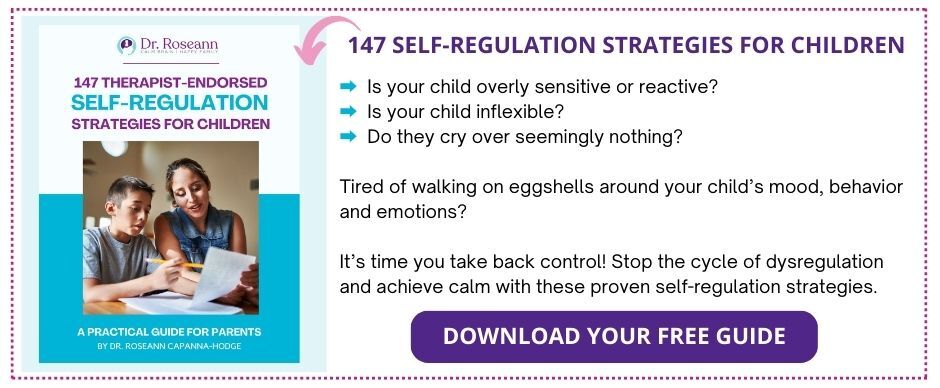As the brain plays a vital role in emotion regulation and other cognitive processes, it can impact behavior in various ways, especially when the brain's normal functioning is disrupted or dysregulated which is why we often talk about how a dysregulated brain results in dysregulated behaviors.
Join us in today’s episode as we discuss calming the dysregulated ADHD brain with our special guest, Dr. Kate Coffey, who is one of our amazing clinicians in our Brain Behavior Reset Program.
What are some of the behaviors that you see when kids are dysregulated?
We have to understand that we have under-stimulated and overstimulated behaviors which may either be clinical or not. This explains instances wherein our kids’ reactions are not congruent to the situation. Sometimes, even in such a simple situation, they overreact. They have a hard time processing their emotions and responding to some situations.
Kids with ADHD brains tend to be so unfocused, badly affecting their performance in accomplishing tasks, even something as simple as making their own bed at home. They exhibit low tolerance when it comes to frustration, stress, and anxiety.
Most people think the only solution available for them or their kids is medication when they are diagnosed with a mental health condition or they exhibit dysregulated behaviors. However, there are natural solutions, such as proper diet, healthy lifestyle, and various forms of therapy, that can significantly improve our kids’ behaviors and will likely lead us to success.
Also helpful is the QEEG brain mapping which is an effective tool in identifying what’s really going on in our kids’ brains when we’re left clueless as to the reasons behind their dysregulated behaviors. It involves utilizing an electroencephalogram (EEG) to record and assess the brain's electrical patterns, as well as applying quantitative analysis tools to build a detailed map of brainwave activity.
As such, QEEG can provide us with possible neurological markers and dysregulation patterns that may be associated with the behaviors exhibited by the kids. This will help us in crafting appropriate and personalized treatments, intervention strategies and other approaches.
What is “twice exceptionality”?
Twice exceptionality is a term that refers to those kids that are identified as gifted but also face some kind of developmental challenges. Twice-exceptional kids are more prone to deep behavioral dysregulation which means that the brain regulates and the behavior falls apart.
Furthermore, kids who are twice exceptional may have asynchronous development, in which their intellectual, emotional, and social developments do not match which may lead to frustration and miscommunication.
Time is one of the most important pieces of therapy.
Healing takes time; it is not a quick fix, but rather a long-term journey of healing, growth, and positive transformation. That’s why time is one of the most essential factors in therapy as it involves gaining new insights, perspectives, and coping strategies.
Moreover, therapy does not only involve healing immediate problems, but also with promoting long-term growth and overall well-being. That is why positive changes and a stronger sense of self take time to develop.
Remember that patience, commitment, and persistence in attending therapy sessions are all crucial factors in letting the therapeutic process take place and provide significant results over time.
Calming the dysregulated brain is the key to steer people away from being stuck in such a state. In line with this, a modality that’s been helpful in healing trauma and other stress disorders is somatic experiencing – a therapeutic model developed by Peter Levine, PhD.
And although it’s a great tool to aid parents in teaching kids to self-regulate, we have to keep in mind that there is also power in the little things. Trust the process. We have to teach our kids to help themselves and believe in positive development and not just solely rely on the treatments.
It’s incredible how effective neurofeedback therapy and somatic therapy is. They work well together and positively develop many clients, not just kids but even adults. Also, a device called PEMF continues to prove its effectiveness in calming the brain by toning down big emotions and getting rid of cognitive-distorted thoughts.
When you have a dysregulated kid, you have to take care of yourself.
As a parent, taking care of yourself is non-negotiable especially when you have a dysregulated kid because your kid regulates himself/herself off you. It’s not going to be easy when you’re overwhelmed but a good shortcut for this is PEMF.
This is not to say that mindfulness-based activities and meditation aren’t as helpful though. They still help significantly in calming the brain. There are always going to be stressors in our life but it’s important to shield our kids from putting themselves in an overstimulated state.
What's one thing you wish every parent knew?
If there’s one thing that Kate wishes every parent knew, it’s that they shouldn’t have to worry so much. It’s important to find a balance. A good way to do this is by maintaining an open and healthy communication with your kids which will help ease your worries.
It’s also important to have a great support system that’s going to help them and be with them throughout this parenting journey. It can be beneficial for parents to look for help from their friends, relatives, or mental health experts as they can provide parents with reassurance by discussing or sharing their concerns among themselves.
Our Brain Behavior Reset Program is about taking what works, what we know to work and doing it in the right order at the right time in the right way. If you’re interested in working with Kate or being in our program, you can get help and work 1:1 with us, click here to apply.

Links and Resources:
➡️ Join our FREE Natural Parenting Community to receive science-backed resources for your child and family. Join here.
➡️ “Is it ADHD or something else?” Take the quiz.
➡️ Read our Dysregulated Kids Guide.








